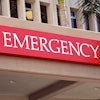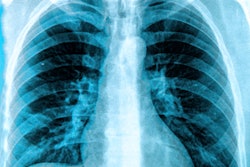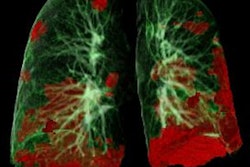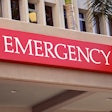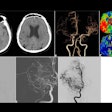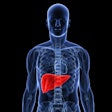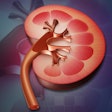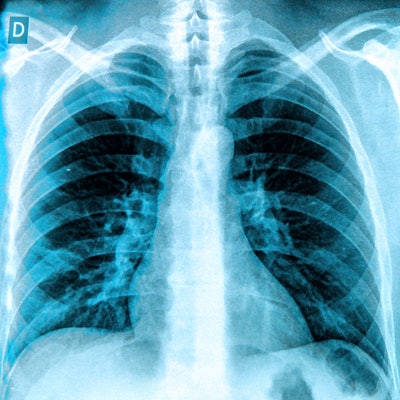
Understanding chest imaging patterns prompted by the COVID-19 pandemic -- specifically, what time of day most of these exams are ordered -- is useful for healthcare providers as they deal with similar crises going forward, according to a study published March 3 in PLOS One.
The ability to anticipate a deluge of imaging requests in the midst of a pandemic could help radiology departments better plan patient care, wrote a team led by Dr. Daniel Koehler of University Medical Center Hamburg-Eppendorf, Hamburg, Germany.
"The demand for COVID-19-related chest imaging displayed distinct distribution patterns depending on the sector of patient care and point of time during the SARS-CoV-2 pandemic," the group wrote. "These patterns should be considered in the allocation of resources in future pandemic challenges with similar disease characteristics."
Real-time reverse transcription polymerase chain reaction (RT-PCR) testing is the first line in the arsenal of COVID-19 diagnostic tools, but chest x-ray and chest CT are also used, typically for disease management, the group noted. And in a pandemic situation, the imaging department can be overloaded, making its staff and its patients vulnerable to infection.
"To prevent overcrowding and to preserve the wellbeing of health care professionals, efficiency in the diagnostic process of COVID-19 patients should be high as possible," the authors wrote.
To explore whether the demand for chest imaging in patients with suspected or confirmed COVID-19 shows temporal trends, the team conducted a study that included 243 patients who underwent 551 chest imaging exams between February and May 2020. Of the chest imaging exams, 82 (14.9%) were CT scans and 469 (85.1%) were x-rays.
Of the 551 exams, 32.8% were of outpatients and 67.2% were of inpatients. The researchers tracked requests for imaging for three time intervals: 6:00 a.m. to 2:00 p.m.; 2:00 p.m. to 10:00 p.m.; and 10:00 p.m. to 6:00 a.m. Clinicians requesting the exams included physicians from the emergency department -- which represented the majority of requests, at 84.6% -- from the wards (9.5%), and from intensive care units (6%).
The group found that most requests for imaging in outpatients with suspected or confirmed COVID-19 occurred between 2:00 p.m. and 10:00 p.m., with a peak around 7:30 p.m. Requests for chest imaging in hospital-admitted patients tended to occur between 6:00 a.m. and 2:00 p.m., with a peak around 12:50 p.m.
| Time distribution of COVID-19 chest imaging requests by patient type | |||
| Patient type | 6:00 a.m. to 2:00 p.m. | 2:00 p.m. to 10:00 p.m. | 10:00 p.m. to 6:00 a.m. |
| Outpatients | 19.9% | 50.8% | 29.3% |
| Inpatients | 52.7% | 31.1% | 16.2% |
The study results should help radiology departments deploy staff effectively in times of crisis, according to the investigators.
"The knowledge of these distribution patterns could help manage radiology departments during a second wave or in future challenges with a similar need for imaging," they concluded. "To prevent physical and mental overload, radiology departments need to distribute personnel optimally in times of increasing case numbers."




